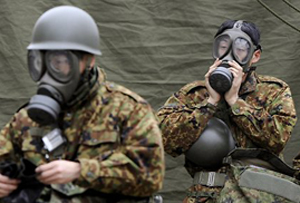
The French government is sending a stock of iodine tablets to its overseas territories of the Pacific – as a “preventive measure” in response to the Japanese nuclear power plant crisis.
In a statement, the French Ministry for Overseas said the decision was made to send a consignment of iodine tablets to New Caledonia, Wallis and Futuna and French Polynesia, mainly because of the shipping delays associated with the remoteness of these French islands and because no suck quantities of iodine tablets are permanently stocked there.
The tablets, once delivered, would be stocked, but the need for a distribution to the population has so far been ruled out.
“At this stage, it has to be reminded that no contamination risk exists for these territories. The risk, which depends on one hand on emissions in Japan and on the other hand on atmospheric currents, is being monitored in real time by the (French) monitoring network of the Institut de Radioprotection et de Sûreté Nucléaire (IRSN, institute for radioprotection and nuclear security), the French government said.
The crisis at Japan’s Fukushima Daiichi nuclear plant remains critical and has been ranked by French nuclear authorities as a category six on a seven-point scale of nuclear accidents – one step below Chernobyl.
France has the largest nuclear industry in Europe.
In French Polynesia, following the Paris announcement, it is expected that a stock of some 500,000 iodine tablets will be made available and stocked by the French Army health services.
Still in French Polynesia, local tourism minister Steeve Hamblin also announced on Wednesday that a Papeete-Tokyo Air Tahiti Nui scheduled flights later this week has been cancelled.
Minute of silence
The local Ministry of Education also announced that today all schools, primary and secondary, would observe one minute of silence as a sign of “solidarity for the people of Japan”.
In New Caledonia, the French High Commission has also announced that a scheduled inbound flight from Tokyo, arriving today, was to be subjected to radioactivity controls.
The French High Commission also stressed that “at this stage, no risk of increase of the level of radioactivity for New Caledonia was to be feared”.
The basis for such advice was mainly that “atmospheric exchanges between the northern and the southern hemispheres are very limited and in case of significant nuclear emissions from Japan, they would circulate within the northern hemisphere”.
“Besides, the distance between New Caledonia and Japan would render local fallout infinitesimal, even in the event of an aggravated accident”, the French High commission in Nouméa said in a release.
In the American Pacific, where the US territories nearest to Japan, in the Northern hemisphere, are Guam and the Northern Marianas, Northern Marianas acting Governor Eloy Inos said on Wednesday that the US federal government would despatch radiation monitoring devices if
required.
Inos, however, stressed that at this stage, the Japanese nuclear situation still posed no immediate threat to the American Pacific territory.
The US National Weather Service and its NOAA (National Oceanic and Atmospheric Administration), its antennas in Guam, as well as other US agencies based in Hawaii, are also maintaining a close watch on the situation.
Cable reaches nuclear power plant
Other stories on Pacific Media Centre Online



